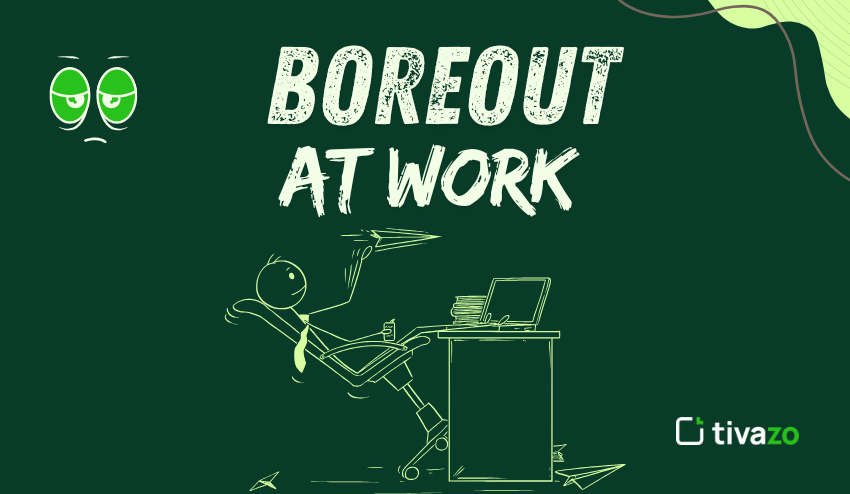Have you ever sat at work feeling completely disconnected, unchallenged, or just plain bored? If the answer is yes, you might be feeling something that’s known as boreout. Unlike the better-known condition of burnout, which is derived from the stress of too much time, too many things to do, the boreout experience is a result of too little. Too little meaningful work, too little focus, too little fulfilment. And yet, it can be detrimental to your motivation, mental wellbeing, and potentially your career, just as burnout can.
In this blog post, we’ll unpack boreout and define what it is, how to identify boreout (for yourself and in your team), what to do about it, and whether it would be best to quit your job.
What is Boreout at Work?
Definition & Origins
Boreout is a psychological condition marked by prolonged boredom and under-arousal in the work environment. As indicated by its Wikipedia entry, boreout is defined as, “a psychological syndrome as a result of a mental underload in the workplace as a result of a lack of adequate either quantitative or qualitative workload.”
This term was introduced to the lexicon in the book Diagnose Boreout, published in 2007, by Swiss consultants Philippe Rothlin and Peter Werder.
The authors identify the three main components of boreout as boredom, lack of challenge, and lack of interest.
Boreout vs Burnout – The Main Difference
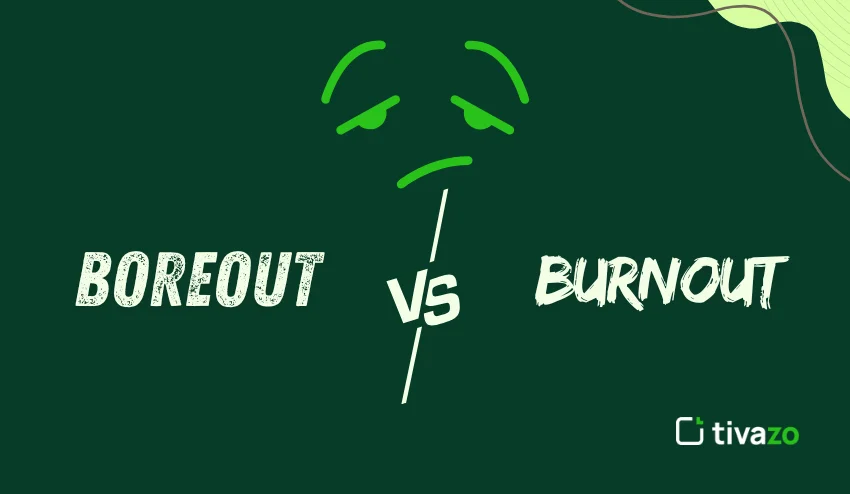
| Syndrome | Cause | Typical Feelings | Core Difference |
| Burnout | Overload (too many tasks, too much stress) | Exhaustion, cynicism, anxiety, Overwork | overwhelmed |
| Boreout | Underload (too few/unpleasant tasks) | Apathy, boredom, under-engagement, distachment | Too little meaningful work, not challenged |
As one article states, “Burnout is when you are overstimulated, while Boreout is when you are understimulated.“
Burnout and Boreout may not spur motivation and productivity but they are opposites. Burnout comes from a high demand workload, tight deadlines, and constant pressure, while the opposite, boreout, comes from working on the same type of work and the work lacks creativity or purpose. Interestingly, different happenings lead to the same eventual outcome: burnt out; impact (emotional exhaustion, low morale, and disengagement).
The difficulty for organizations is striking the right balance in a workload and stimulation: enough stimulation to keep employees engaged, but not over-stimulated. Knowing whether the zapped feeling comes from fatigue from too much, or boredom/under-stimulated due to not enough, is critical for both employees and organizations to determine the best intervention strategy.
The Importance of Boreout
At first, it may seem harmless: “I’m bored at work” – what can you do? But boreout is much more than a state of boredom that may happen occasionally. It’s chronic, draining, and sneaky. One blog on management warned, “boreout isn’t just boredom. But it’s a big deal. What boreout will do is drain motivation, lower performance and silently drive good people out of your business.” – MTD Training
Boreout can hurt productivity, disengagement, retention, and even show physical and mental health ramifications. Certainly, if you’re in management, or HR, you want to know about and address boreout for a healthy culture and retaining talent.
Here is why boreout really matters:
- Lowered innovation: Employees that experience boreout stop bringing creative ideas, squashing innovation and progress.
- The illusion of productivity: Workers may be giving the appearance of being busy, but are just going through the motions with little accomplished in terms of productivity.
- General morale decline: Engagement declines in employees and that turns into a team issue for low morale and lack of overall motivation, mood, network, and connection to work groups.
- Talent loss: Usually, high performers who crave challenge will leave first. This becomes financially costly.
- Health: Chronic under-stimulation can bring anxiety and depression about performance and lowered self-worth.
- Brand: An under-stimulated workforce over time can impact customer satisfaction and employer branding.
Signs of Boreout
If you are unsure whether you yourself or a team member is showing signs of boreout, here are common symptoms to look for.
1. Common Symptoms
- Chronic feelings of boredom or “just going through the motions” at work.
- A feeling of under challenge: task is too easy or are boring, repetitive, or lack meaning.
- Losing interest or motivation regarding things you once cared about.
- Feeling detached or apathetic: doing what you need to do to meet the requirements of the job, but are not engaged.
- Procrastination, even though you have limited workload.
- Physical symptoms, such as headaches, low energy, insomnia, or mood changes.
- Hiding work situations, or responsibility, or even to convey you are busy (often referred to as “looking busy”).
2. Signs in the Workplace
- Employee appears somewhat or overly passive, with little to no effort to volunteer new ideas, or always finish things earlier than others or simply stall.
- Gradual decline in performance or new tasks that may appear subtle, but are reliable symptoms.
- Quiet teams that appear compliant, but have gone dark, as one manager-guide strips it: “roles may be completed, but without energy or purpose.”
- Coping behaviours that may be observed: frequent browsing of the work-related internet, other personal tasks that could demonstrate working hard.
3. Deception Strategies” (What People with Boreout Do)
- Agreed: known as coping behaviours that hide boreout from the boss. Examples include:
- The stretching work strategy: take a simple task and stretch it out over several days or longer to make it appear that you’re busy.
- The pseudo-commitment strategy: Stay late, attend additional meetings, come in early, and don’t really do anything meaningful.
These strategies make it possible for others to sadly overlook boreout if a person’s behaviours simply seem “working” while the person is totally mentally disengaged.
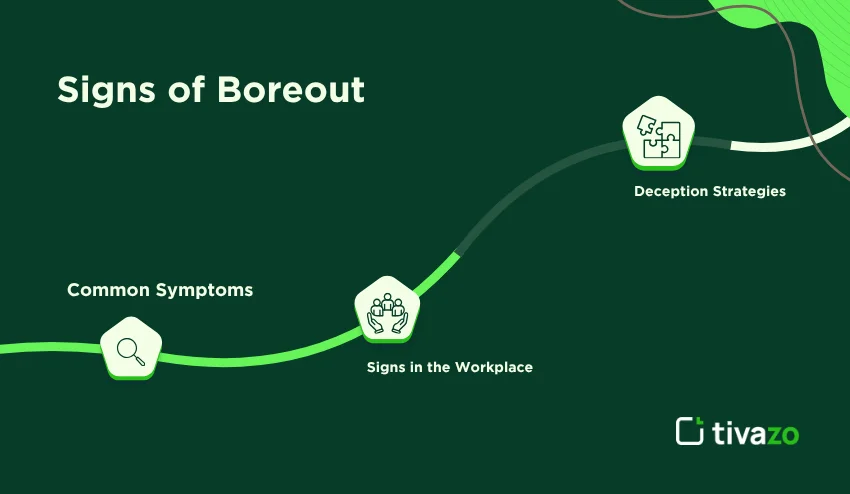
How to Deal with Boreout at Work
ow we will shift from being informative to actionable. Whether you are an individual who is bored at work, or a manager who wants to help your team, try the next approaches.
Self-help for Individuals (Stop Being Bored at Work)
If you identify boreout, then here is what you can try:
1. Self-diagnose yourself be aware that:
- Your work assignments leave you under-challenged or unstimulated.
- You are unmotivated and feel bored or detached.
- You are procrastinating and have plenty of time to work.
- Recognizing the problem is the first step.
2. Reflect on your values and purpose ask yourself:
- Why did I take this job in the first place? Are those reasons still valid?
- What part of my work energizes me?
- What work tasks feel meaningless or just “fillers?”
- This is the same advice for burnout too but in boreout you will reflect on under-challenge.
3. Seek variety and learning boredom usually comes from repetition:
- Ask for a more complex assignment or project.
- Seek cross-functional work or a project that is a stretch goal.
- Ask for or start a project on the side, in relation to your role, which is of interest.
4. Talk with your boss – even when it feels awkward.
- You might frame it as: “I think I can contribute even more and would like to work toward X.
- Present ideas for improvement instead of just complaining.
One blog states: “brining the issue to their attention is the initial step in finding a resolution that benefits everyone involved.”
Be active & engaged outside of work – when your day job drains you, boredom can spill over into life
5. Enjoy hobbies and/or learning pursuits.
- Talk with colleagues for new ideas and to support one another.
- If warranted, consider a job change, but only after checking for any internal solutions.
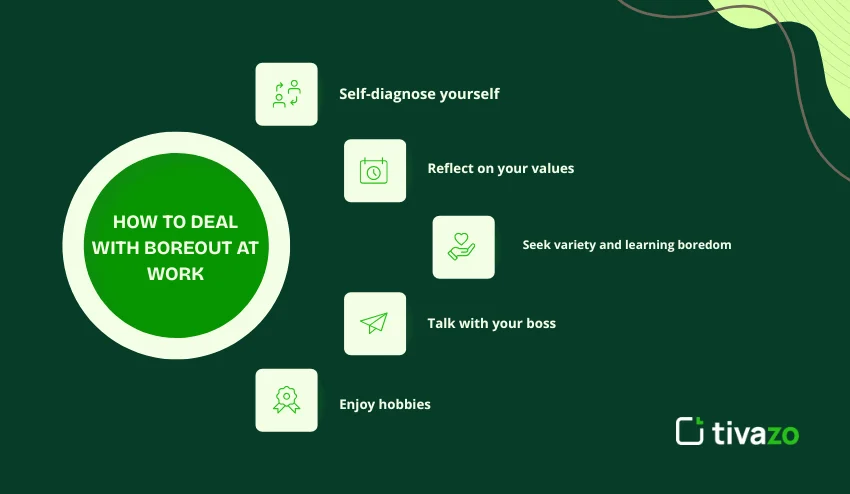
For Managers & Teams
If this is being read for investment on behalf of your team (e.g. HR, manager, team lead), here are empirically-based approaches to combat boreout:
1. Diagnose the symptoms
- Use regular check-ins: ask team members, “How challenged do you feel in your role?“
- Observe behaviour: consistent underperformance, disengagement, looking at the clock, excessive use of social media.
- Assess role design: are activities monotonous and without variation? Are some members underutilized while others are overloaded?
2. Redesign roles for engagement
- Give prompts: give team members autonomy on how they want to complete work (and what they consider valuable work). Characterizing and/or identifying autonomy often makes team members happier.
- Connect to the bigger picture: what is a meaning of an entry task or project beyond “busy” work?
- Balance routine with new responsibilities: combine distinctly repetitive task(s) with a new/creative task(s).
- Encourage skills development: when appropriate, provide training, rotation, job-shadowing, etc. to promote ongoing engagement.
- Recognize engagement: recognize and reward effort/engagement, no matter how small.
- Adopt a culture that enables “challenge & support” as opposed to “control & idle”.
3. Ensure managers are aware & role becomes a culture
- Managers should never assume “quiet team = healthy team.” Per one guide: “quiet compliance can mask a deeper issue…. drop in energy, focus and motivation.”
- Provide safe space: employees may feel that admitting or owning their boredom will reflect poorly on them or make them look disengaged.
- Assess and include engagement metrics (as a manager) beyond just productivity.
- Assess job-design by level periodically, especially inter individual contributor who may lack.
Should You Resign If You’re Experiencing Boreout?
This is a weighty question and one that many ask: “If I’m bored all the time, am I right to just leave?” Let’s break this down.
Things to Consider
- Length & severity: How long has this been going on, and is it has it been days, weeks, months, or years? Chronic boreout carries greater risk.
- Internal solutions tried? Before quitting, ask the following question: Did you make an effective effort to make adjustments to the boring aspects of your work? Did you tell someone? Did you ask someone to try to improve things? Did you work on a redesign of your role in collaboration with others?
- Personal variable: Financial security, labor market conditions, other job opportunities elsewhere.
- Health & wellbeing burdens: If being bored was spiraling into a depression, physical impairment, low self-worth, this is no longer “just” a boring job – this is a risk.
- Growth capability: Will this job/organization allow you to grow into new opportunities, or will you be condemned to stagnation in boreout?
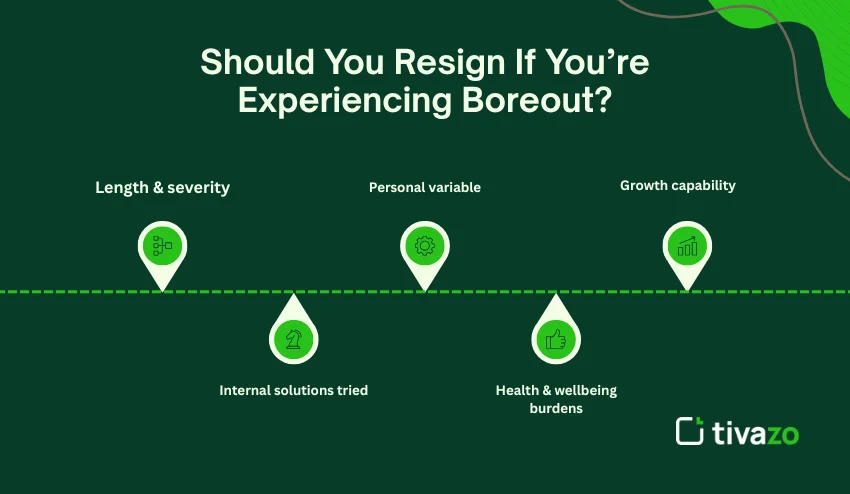
When Resigning May Be the Right Option
- If you have raised the desire for more and have been denied, or you think the organization would show little to no interest in attempting a change.
- If the implicit content of your role is designed to be boring, (e.g., purely administrative, no chance of variety or development), and you guess this will persist or get worse.
- If as a result of the boreout experience your mental or physical health is worsening.
- If you have a specific job opportunity in mind or otherwise are willing to risk the potential costs to seek after options.
Conclusion
Boreout is a serious problem in the workplace and often brushed aside. It is the opposite of burnout defined by boredom and under-challenge rather than stress and overload. Spotting the signs of boreout, whether in yourself or your team, can help prevent a downward spiral into disengagement, diminished productivity, and lost motivation.
Take action, whether you are an employee or a manager, to create challenge, meaning, and diversity in your work. Do not ignore the signs of boreout take steps to reengage, look for new ways to grow, and get your purpose back in your job before boreout becomes the default condition.
